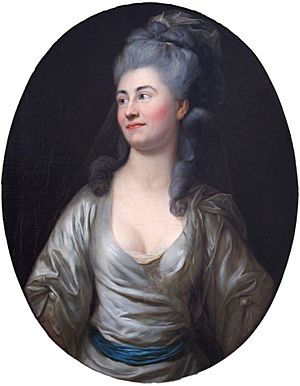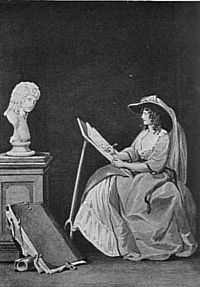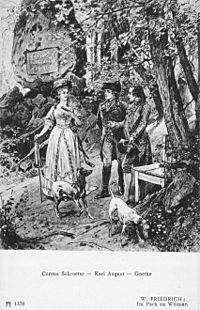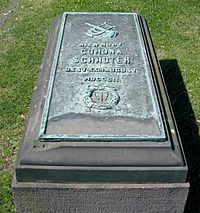Corona Schröter facts for kids



Corona Elisabeth Wilhelmine Schröter (born January 14, 1751 – died August 23, 1802) was a talented German musician. She was best known as a singer. Corona also wrote her own songs, putting poems by famous writers like Friedrich Schiller and Johann Wolfgang von Goethe to music.
Contents
Early Life and Musical Training
Corona Schröter was born in Guben, a town in Germany. From a young age, she learned to play many instruments. These included the keyboard and guitar. Her first music teacher was her father, Johann Friedrich Schröter, who was an oboist. He also taught music to her three brothers and her sister.
Her brothers, Johann Samuel and Johann Heinrich, became a pianist and a violinist. Her sister, Marie Henriette, was also a singer. Corona received early musical training that helped her become a skilled performer and composer. However, her first singing lessons actually hurt her voice.
When Corona was thirteen, her family moved to Leipzig. There, she met the composer Johann Adam Hiller. Hiller was frustrated that girls did not get good music education. So, in 1771, he opened his own school. Boys and girls learned many musical subjects there. They studied singing, how to speak clearly, and how to play the keyboard.
Corona became a wonderful singer at Hiller's school. She learned new techniques that did not harm her voice. She was a powerful performer. People often compared her to another student, Gertrud Schmeling. Corona's voice was not as strong as Gertrud's because of her early bad training. But her fans thought she had an amazing intensity that no one else could match.
Life and Work in Weimar
While at Hiller's school, Corona Schröter became good friends with Johann Wolfgang von Goethe. Goethe was a very famous German writer. When he moved to Weimar in 1775, he invited Corona to join him. She became a court singer for Duchess Anna Amalia. Her first performance at the court was on November 23, 1776.
Even though she was hired as a singer, Corona also got involved with the court's amateur theater. She acted in at least eighteen plays. Many of these plays were written by Goethe himself. Corona and Goethe worked together on many of his popular plays. Sometimes, Goethe even acted alongside her. For example, they performed in his play Iphigenie auf Tauris in 1779.
Goethe's musical play Die Fischerin was very important to Corona. She played the main character, Dortchen. She also wrote some of the music for the play. This included the famous opening song Der Erlkönig. Her version of Der Erlkönig is quite different from the one Franz Schubert composed much later. Corona also starred in Goethe's drama Proserpina. People came from everywhere to see her amazing solo performance in this play.
Corona and Goethe worked closely on music for the Weimar theater. They also created pieces for their own personal music collections between 1776 and 1782.
Later Years and Published Works
In 1783, professional actors replaced the amateur court theater. Corona continued to sing and act in informal settings. She also started teaching singing. She spent time writing and creating art. In 1788, she officially stopped performing for the court. During these years, she became friends with Friedrich Schiller. She later set some of his poems to music.
Sadly, many of her works are now lost. These include her songs (called lieder) based on Schiller's poems. Also lost are her two dramas, hundreds of arias and duets, and an autobiography she gave to Goethe in 1778.
However, two collections of her lieder were published. The first came out in 1786, and the second in 1794. This means they still exist today. The first collection included her version of Der Erlkönig. It was more popular than the second collection. This was probably because it was simpler. The second collection had many songs in French and Italian. These two collections are some of the first and largest collections of songs published by a woman.
When her first collection was released, Corona Schröter wrote about her feelings:
I had to think a lot before deciding to publish these short poems with my melodies. There's a feeling among women that we shouldn't appear alone in public. So, how can I present my music to everyone without feeling shy? The kind words from a few people might just be out of pity. And any work by a lady might get some pity from other experts too.
A review of her first collection said that her composing skills were not as good as her potential. The reviewer felt the songs had a lot of spirit. But they were not written in a way that showed this spirit well. He did say that hearing the songs performed helped people understand them better. He thought her lack of formal education was the reason for this problem. This was a common issue for women artists at that time.
Corona Schröter was also remembered in other ways. In 1782, Goethe praised her during a speech for a theater director who had passed away. He said she helped shape theater in Weimar and even helped him. Seven years earlier, a book about theater history was dedicated to her because of her well-known talents.
Corona spent the last eight years of her life teaching acting and singing. But she had lung and breathing problems. Because of this, she had to move from Leipzig to Ilmenau in 1801 with her friend Wilhemine Probst. Her health was so bad that she never got better. She died there a year later.
See also
Template:Kids robot.svg In Spanish: Corona Schröter para niños
 | Bayard Rustin |
 | Jeannette Carter |
 | Jeremiah A. Brown |


